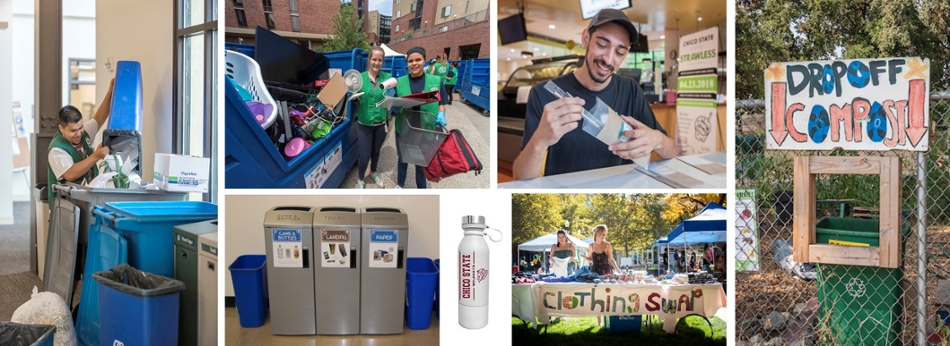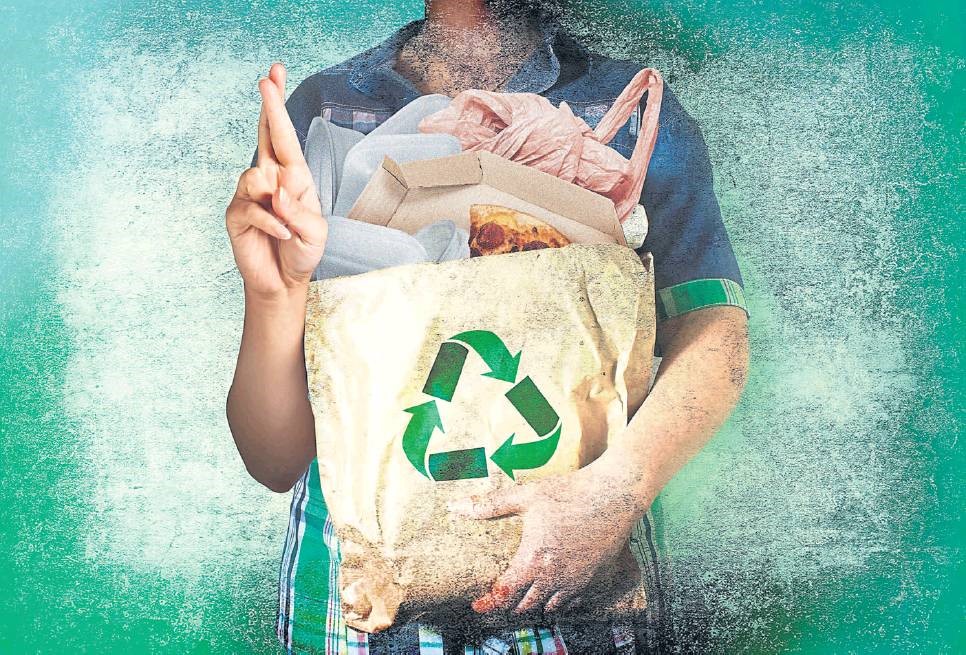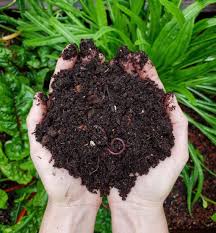
Zero Waste at Chico State

What is Zero Waste?
Zero waste mimics natural cycles where materials are not simply discarded but recovered for beneficial use. The internationally accepted definition of zero waste states that at least 90% of total solid waste generated, measured by weight, is diverted from landfills through reduction, redesign, reuse, recycling, and composting. To reach true zero waste, emphasis must be placed on eliminating waste before it occurs rather than relying on recycling and composting.
We must still ensure that items that cannot be designed out or reused are recycled or composted correctly. Below you will find resources to help you make the best zero waste decisions while on campus, out in the community, and at home.
"If it can't be reduced, reused, repaired, rebuilt, refurbished, refinished, resold, recycled, or composted then it should be restricted, redesigned, or removed from production." ~Pete Seeger
Recycling at Chico State
In summer 2020, the long-standing AS Recycling program came to a close and Facilities Management and Services (FMS) assumed responsibility for collecting all recycling from the Chico State campus. FMS is in the process of upgrading recycling collection bins and signage across the campus - including consistency and easier to read labeling - so please be patient as things are worked out.
Check the recycling pick up schedule to find out when your building will be serviced (PDF)
If you have any questions, feel free to call FMS at 530-898-6222.
Chico State Recycles
- Cans
- Glass & plastic bottles
- Cardboard
- Newspaper, office paper, and magazines
Pro-Tips for Recycling on Campus
- Flatten cardboard and leave next to collection bins
- DO NOT add anything with food or liquid to the recycling bin
- Shredded paper is NOT acceptable in the recycling bin (contact FMS(opens in new window) for shredding services)
Are You A Wishcycler??
 A wishcycler wishes something to be recyclable when in reality it probably isn't. Just about everyone is guilty of wishcycling at some point but wishcycling can have pretty negative impacts to the recycling system. We get it, recycling is confusing... Are there papers that can't be recycled? All plastics are recyclable, right? Should I leave bottle caps on or off? To attempt to clear up some of the confusion, we hosted Recycling 101 trainings over this summer. These trainings were designed to educate users on how the recycling system works, how materials flow through the system, and how to be champion recyclers.
A wishcycler wishes something to be recyclable when in reality it probably isn't. Just about everyone is guilty of wishcycling at some point but wishcycling can have pretty negative impacts to the recycling system. We get it, recycling is confusing... Are there papers that can't be recycled? All plastics are recyclable, right? Should I leave bottle caps on or off? To attempt to clear up some of the confusion, we hosted Recycling 101 trainings over this summer. These trainings were designed to educate users on how the recycling system works, how materials flow through the system, and how to be champion recyclers.
Recycling Myths Debunked
- Most Americans recycle as much they can
False
According to the US Environmental Protection agency, Americans only recycle or compost 32% of the total solid waste they generate(opens in new window) with the average person generating 4.9 pounds of trash every day. That's a lot of waste! In California(opens in new window), the average person generates 6 pounds of trash every day and we only recycle and compost roughly 45%. Chico state is about on par with the national average in that we divert only about 35% of our solid waste from landfill. We have a long way to go before we meet the CSU system goal of diverting 80% of our material from landfill and will need everyone's help to get there!
- The chasing arrow symbol (recycling mobius) on a container mean it is recyclable at a Material Recovery Facility (MRF)
False
Manufacturers strive to get eco-friendly information on their product labels. It sells. However, the Mobius is not an indicator of whether something can or will be recycled. On plastic, i indicates what type of plastic it is. There are seven basic types of plastic, each noted by the number inside the chasing arrows. In most facilities, only numbers 1 and 2 are sorted for recycling.
- Containers must be squeaky clean in order to be recycled
False
While all bottles, cans, and containers should be clean, dry, and free of most food waste before you place them in your recycling container, they don’t need to be spotless. The goal is to make sure they are clean enough to avoid contaminating other materials, like paper. Try using a spatula to scrape cans and jars, or using a small amount of water and shake to remove most residue.
- It doesn't matter if something belongs in the recycling cart, throw it in anyway it will get sort out
SO VERY FALSE!!
There are increasing amounts of non-recyclables sent to Material Recovery Facilities, and every single one of them must be removed by hand by trained staff and/or mechanically sorted, or they end up contaminating high value recyclables. Non-recyclable garbage placed into recycling containers increases the cost of the recycling process, thus your bills.
Similarly, recyclable items placed into garbage containers end up in the landfill. The right thing to do is to put the correct recyclables (cans, bottles, paper) in the recycling bin and everything else in the landfill bin. When in doubt, throw it out (in the trash)!
- Aerosol cans are acceptable in recycling carts
Varies by jurisdiction
Most of recycling programs accept empty/dry aerosol cans. Aerosol cans without the caps are recyclable if they are empty/dry. If they are not, then they could be dangerous. Some fires are caused in baler chambers from trace amounts of can chemicals, and cans have been known to become projectiles when densified/ baled if propellant is still present. Waste Management facilities and commodity vendors accept steel, mixed metal, and aluminum aerosol packages. Multi-material aerosol packages are not recyclable. There is no gray area here from a processor standpoint. However, some cities still list aerosols on their no-recycle lists. Check with your local municipality for further information.
- Hoses, tanks, shower curtains, swing sets, and more are made of plastic, so... they must recyclable, right?
Absolutely false!
If it’s not a plastic bottle, it probably doesn't belong in your recycling cart and may even require special handling. A bottle is defined as the opening being smaller than the base (think soda bottle, shampoo bottle, mustard bottle, etc.). Just because an item is made from plastic, or contains plastic parts, doesn't mean it can be recycled. There are other resources(opens in new window) that can help find places for hard to recycle items.
Importance of Composting
There are many benefits to composting:
- Organic waste in landfills generates methane, a potent greenhouse gas, while composting generates a nutrient-rich food source for plants
- Reduces or eliminates the need for chemical fertilizers
- Promotes higher yields of agricultural crops
- Aids reforestation and habitat revitalization by improving contaminated, compacted, and marginal soils
- Enhances water retention in soils
- Improves carbon sequestration
Composting is also easy to do! You can visit the AS Compost Garden(opens in new window) to learn more about composting and how you can build a composting system that works for you whether you live in an apartment or have a backyard. Check out the EPA's Sustainable Food Management Guide(opens in new window) for more info.
Campus Goals and Requirements
There are several state mandated recycling and composting requirements as well as adopted zero waste goals within the California State University (CSU) system:
- AB 1826(opens in new window) requires collection and composting of yard trimmings and food scraps from all State and business facilities
- AB 341(opens in new window) requires recycling collections at all State and business locations
- The CSU Sustainability Policy (PDF) states that all campuses shall divert 80% of solid waste from landfill by 2020 and move toward zero waste beyond that
- The CSU Single-Use Plastics Policy (PDF) requires the elimination of single-use plastic water bottles, straws, and bags as well as all Styrofoam
- In addition, the Associated Students have passed a number of policies and referendums related to zero waste(opens in new window)
